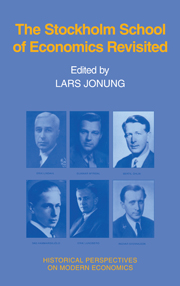The foundations of Swedish economics
Sweden has produced two generations of outstanding economists. The first generation, which included David Davidson, Knut Wicksell, Gustav Cassel, and Eli Heckscher, were the founders of economics as an independent academic discipline in Sweden. These men made economics a well-known and respected subject in the eyes of the public, thus paving the way for the second generation that emerged in the 1920s and 1930s. This second generation attracted worldwide attention and became known as the Stockholm School.
Davidson (1854–1942) was appointed professor at Uppsala in 1889, a chair that he held until 1921. In 1899 he founded Ekonomisk Tidskrift, the first scientific journal in economics in Sweden, and remained its sole editor until 1939 when he retired at the age of eighty-five. Under Davidson's editorship, Ekonomisk Tidskrift became established as an important forum for the emerging economics profession, with Wicksell, Cassel, and Heckscher as early major contributors. Here Davidson himself published a large number of articles and comments on current economic events, particularly dealing with monetary issues and problems of taxation.
In the late 1870s a young man presented a public talk in Uppsala, in which he argued that the major social ills in Swedish society were due to overpopulation. His message immediately became a source of immense public debate and criticism. One of his critics was David Davidson, who suggested that the speaker, Knut Wicksell (1851–1926), lacked a knowledge of economics.
